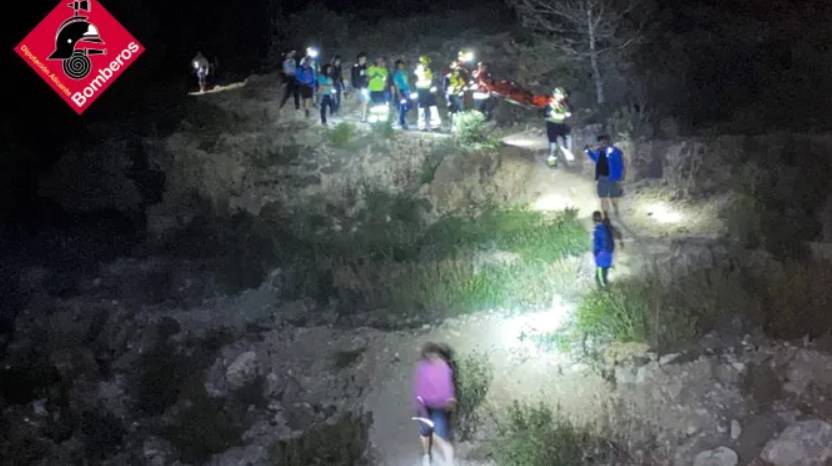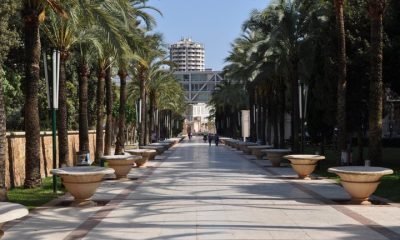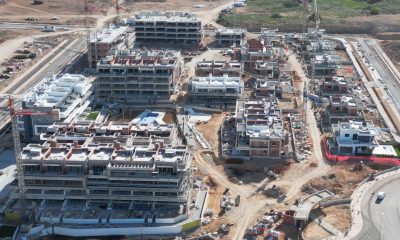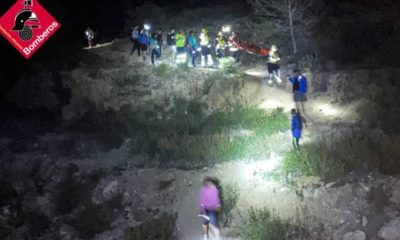Costa Blanca
48 arrested for sexually exploiting 1,000 women in Alicante clubs

A criminal organisation reportedly involved in the trafficking of women for the purpose of sexual exploitation in strip clubs in the province of Alicante has been dismantled by the National Police. 48 women have been released and 48 people have been arrested as a result of the operation (two in Murcia and 46 in Alicante, six of whom have been placed in provisional detention).
Over 1,000 women are thought to have been exploited by the network in the past 12 months. False job offers deceived the victims, who were primarily from South America, into travelling to Spain.
Three strip clubs have been shut down by the National Police after conducting eight house searches in Alicante. They have also blocked 938,000 euros in bank accounts, immobilised 17 properties valued at 1,313,087 euros, confiscated eight forbidden weapons, and confiscated over 150,000 euros in cash, among other items.
A complaint on the National Police’s phone line 900 105 090, which, together with the email Trata@policia.es, encourages citizen cooperation and the private and anonymous reporting of human trafficking-related crimes, sparked the inquiry.
The victims were tricked by phoney work offers in Spain’s cleaning and beauty services industries in their home countries, primarily Colombia and Venezuela. The victims were brought to the clubs to be sexually exploited, but the offer did not materialise when they arrived.
Investigators were able to verify the existence of this transnational criminal organisation in Spain, which was situated in the province of Alicante and was operated by two Colombian women and a Spanish national, thanks to the many investigations that were started at that time. The latter spent his weekends with his family in the Murcia region and his weekdays managing his business in Alicante.
The organization’s structure included two tiers in addition to the three leaders: the taxi drivers who were responsible for driving the women on their outings to give home services and the people in charge of the strip clubs.
Clubs in Orihuela, Elche, and Alicante
The criminal group operated three strip clubs in Alicante, Elche, and Orihuela, which they attempted to pass off as hostels or guest residences in order to conceal their operations. Through the sexual exploitation of numerous foreign women in precarious situations, the network had established a commercial structure intended to benefit itself.
The victims, who were residents of the strip clubs themselves, were compelled to work around the clock, were constantly watched by members of the criminal organisation using sophisticated image and sound video surveillance systems, and had limited freedom of movement because they were only allowed to leave the house for two hours at a time.
They received no respite at all during the first week of labour, and starting in the second week, they were only allowed to have one day off under the supervision of the defunct organisation. According to investigations, the network took at least 40% of each service that the women provided; these funds were then handed directly to the organization’s leaders.
In order to draw in more customers, keep from getting arrested, and mimic a legitimate hospitality company operation, the victims were transferred between the several clubs. The sale of drugs to customers in the various strip clubs might also be detected.
Discover more from Costa Blanca Daily
Subscribe to get the latest posts sent to your email.
Costa Blanca
Woman injured on the descent of the Cruz de la Muela rescued by firefighters

On Friday, May 2nd, a 51-year-old woman sustained an injury during the annual illumination ceremony, which culminates in the traditional ascent to the Cruz de la Muela in Orihuela. The event attracts numerous hikers and residents.
The victim was unable to proceed on her own after spraining her ankle while descending the path, according to the Alicante Provincial Fire Consortium. At 11:13 p.m., they received the emergency call and initiated the rescue protocol.
Firefighters from the Orihuela Fire Station brought the woman down the hill by hand. She was subsequently transported to an ambulance, where she received preliminary medical care, while being carried on a rescue stretcher. The operation concluded at 12:39 a.m.
Discover more from Costa Blanca Daily
Subscribe to get the latest posts sent to your email.
Costa Blanca
The suspect in the murder of his mother-in-law in Murcia has been placed in a psychiatric ward

The 44-year-old man was detained in Murcia on Wednesday. April 30th, for the death of his partner’s mother. The judge of Murcia’s exclusive court for violence against women number 2 has ordered his provisional detention.
According to sources from the Superior Court of Justice of Murcia (TSJMU), the judge has initiated proceedings against the suspect for two attempted homicides and an alleged homicide.
Furthermore, he has provisionally suspended parental rights over the suspect’s small children and has issued a protection order for his partner.
The suspect is alleged to have killed his partner’s mother with a knife during a fight at a residence in the Murcia district of Sangonera la Seca at approximately 8:00 p.m.
The altercation resulted in the injuries of two additional individuals, namely the father and partner of the arrested man. The suspect was subsequently apprehended on suspicion of homicide.
After the incident, the Guardia Civil, which is currently conducting an investigation into the matter, observed that the detainee and his companion did not have a history of gender-based violence.
Discover more from Costa Blanca Daily
Subscribe to get the latest posts sent to your email.
Costa Blanca
Two thirds of young Spaniards don’t understand English despite studying it for 13 years

According to the INE, seven out of ten young individuals claim that they are unable to comprehend any English, despite having studied it from the ages of three to sixteen. Many young individuals graduate from high school with a subpar understanding of Shakespeare’s language, although they have been instructed for over a decade.
Gregorio Luri, a philosopher and educator who specialises in the subject, asserts that the notion that enrolling a child in an academy is necessary for them to learn English has become ingrained. Therefore, what is the purpose of English instruction in public schools? Most importantly, how can we improve it?
Initially, the educators concur that there is an issue with language acquisition in public institutions that is already having an impact. “We are witnessing a substantial rise in the number of “English Schools” that exclusively instruct in the English language. Luri elucidates that new ones are perpetually generated.
Conversely, the actuality is that families are increasing their expenditures on private schools, which are referred to as “shadow education,” in order to complete their children’s education. This is as per a report by Esade. The educator asserts that this procedure strikes at the foundation of public institutions.
Separate students by level, rather than by course
The interviewed instructors presented a variety of proposals, each requiring a significant modification to the current model. Ana Hernández, a secondary school English teacher in Valencia, has identified three factors that contribute to the low level of English proficiency in public institutions.
The first is the elevated class ratios. “We endeavour to instruct the entire class in English to facilitate communication among students; however, the number of students is not equivalent.” “Academies have even fewer students, which makes it much easier for each student to engage in practical training and speak for an extended period,” he explains.
The disparities in the student body are the second factor. “Academies organise classes according to their respective levels, which range from A1 to C2.” Students are not categorised according to their age; rather, they are categorised according to their proficiency in English. He asserts that courses are significantly more productive when there are eight students who possess comparable English proficiency levels, and they are capable of engaging in conversation with one another.
Secondary institutions face the opposite scenario. “It is exceedingly challenging to accommodate all 30 students, as their proficiency levels are vastly different.” Hernández clarifies: “In my view, secondary schools should also categorise students by level rather than age.” However, I am aware that this is a complex issue.”
This teacher posits that the third factor contributing to the low level of English proficiency is the escalating prevalence of behavioural issues in classrooms, which is closely associated with the high class sizes of up to 30 students.
The penalty for failing the PISA exam
Not only the INE, but also the PISA report, evidences the inadequate language skills of Valencian students. It broadly asserts that students are unable to engage in a fundamental conversation with another individual in English because this report emphasises life skills over theory.
It is evident that this does not affect all pupils in the same way. Those with the financial means enrol in an academy, while those without it end their education with a lack of proficiency. Luri asserts that bilingualism is no longer a luxury; it is now essential, and this unquestionably results in a social gap. Private alternatives are expanding as a result of the needs that public schools are unable to fulfil: language academies and English schools.
Social class and books in the household
The PISA report establishes a direct correlation between the quantity of books in each student’s home and their cultural, and particularly linguistic proficiency. Luri elaborates, “Consider the occasion when we discuss English.” “We are even observing it in university entrance exams, where young individuals experience difficulty when presented with an English text.”
In order to accomplish this, Luri posits that it is imperative to comprehend that “every teacher is a language teacher.” From the third or fourth grade of primary school, pupils’ educational trajectories diverge, according to the educator. The levels are remarkably similar until that year, at which point they begin to diverge. The cause is the quantity of words and the diversity of sounds that each child encounters. “The environment is indispensable.” An infant who is exposed to 2,600 words per hour is not equivalent to one who is exposed to 600. Over the course of four years, the estimated difference between an impoverished and a rich linguistic environment is 40 million words. This underscores the need for all educators to possess extensive and proficient communication skills. Luri elaborates, “And I am of the opinion that this matter is not taken seriously enough.” Consequently, the language proficiency of pupils in English schools is exceedingly high, he maintains.
Assisting those who are experiencing difficulty
Academies are also capable of assisting students who are experiencing academic stagnation or low achievement levels, a capability that public schools lack. “We have returned to the same point, and this is applicable to any topic.” Families are forced to pay for remedial classes at an academy because the school doesn’t help their child enough.”
Lack of vocabulary is another area that needs to be improved in general, since according to Luri, “for a text to be comprehensible, there must be at most 8% of words that you don’t understand. If it exceeds that 8%, the text becomes incomprehensible because you can’t deduce from the context, and our students are far from that level.”
The causes of this problem are even social and cultural. “One curious thing is that when you travel to Latin America, cartoons and movies in English aren’t translated, which makes their familiarity with the language much higher and their vocabulary much larger,” explains the educator.
Other problems the educator has identified include the lack of foreign language instruction hours both in schools and in the pedagogy faculties where future teachers are trained. “There aren’t enough English class hours per week, the teaching methods aren’t the best, and unfortunately, we don’t have well-trained teachers,” Luri explains. “Obviously, no one goes to work expecting to do poorly—quite the opposite—but they need to receive training.”
Discover more from Costa Blanca Daily
Subscribe to get the latest posts sent to your email.
-

 Costa Blanca2 weeks ago
Costa Blanca2 weeks agoGoodbye forever to the traditional butane gas bottle
-

 Costa Blanca2 weeks ago
Costa Blanca2 weeks agoCatral Local Police car ends up upside down after accident
-

 Costa Blanca2 weeks ago
Costa Blanca2 weeks ago“Drug Supermarket” in Denia closed by Police
-

 Costa Blanca1 week ago
Costa Blanca1 week agoBenidorm studies the temperature of its streets to understand “heat island effect”
-

 News2 weeks ago
News2 weeks agoThe Generalitat presents the road map for the widening of the CV-95 between Orihuela and Torrevieja
-

 Costa Blanca2 weeks ago
Costa Blanca2 weeks agoFive injured in a two-car accident in Elche
-

 Costa Blanca1 week ago
Costa Blanca1 week ago‘Cartagena’, the new electric Navy ship
-

 Costa Blanca2 weeks ago
Costa Blanca2 weeks ago44% of homes in Alicante province were purchased by foreigners

















